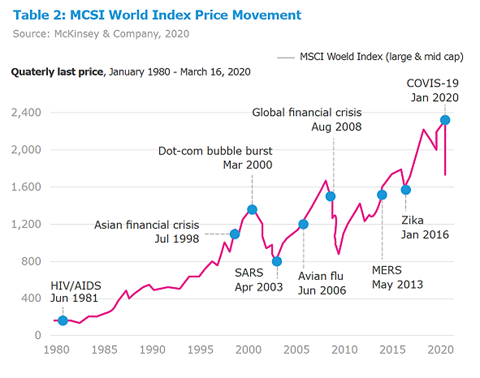Market downturns through history: A 40-year perspective of global epidemics
Table of contents
- Let your strategy be your guide
- Downturns through history
- Responding to a downturn
- Strategies to help you manage volatility
Key takeaways
- The causes of market downturns are varied, including pandemics and other global health crises.
- Over the past 40+ years, market downturns have been relatively short-lived.
- How you should respond to a downturn depends on your personal risk tolerance.
- Strategies that can help you manage volatility.
Related articles
- Seven strategies to help manage volatility and risk
- Concerned about a recession?
- Capitalizing on volatility
- Understanding diversification
- Bull versus bear markets: How to invest in a market downturn
Let your strategy be your guide
When markets take a tumble it’s natural to be concerned about your investments. Corrections can be triggered by any number of issues including politics, financial concerns and, as experienced more recently, global health issues like COVID-19. As health issues—like recent bird flu and measles outbreaks—continue to impact world markets, it helps to have some context to understand the nature of market volatility and decision-making strategies.
It can pay to remember that sticking to your investment strategy is usually the best way to respond to these situations.
Downturns through history
For good or bad, events that impact the market happen regularly. History demonstrates again and again that fluctuations, particularly those caused by global disease outbreaks, have very little effect on financial markets over the medium to long term.
Global epidemics vs. MSCI World Index

Source: McKinsey & Company
As you can see in the chart, over the past 40 years downturns are often short-lived. So, while it can be scary to be in the middle of a market correction, it’s important to remember that it likely won’t last and eventually the market will self-correct.
Responding to a downturn
One of the most common questions people ask during a market correction is what they should do with their holdings. The answer really depends on your overall investment strategy.
How you react to a downturn has a lot to do with your personal risk tolerance. If you’re risk averse, your first impulse may be to sell equities to try and limit losses. Conversely, if you have a high risk tolerance, you may be interested in buying more equities or engage in short selling with quick gains in mind. In either case, it’s important to know the difference between emotionally driven and strategically driven decision making.
There are of course situations in which selling or buying equities during a downturn can be a worthwhile strategic move. For example, choosing to sell some equities at a loss to offset taxes on capital gains.
Before you take any action, a good guideline is to ask yourself how the decision fits within your investment strategy and how it will help you accomplish your financial goals. If you can’t effectively answer both these questions, chances are it’s not the right decision for you.
Strategies to help you manage volatility
It can be challenging to separate your emotions from your finances, luckily there are a few easy things you can do to help you stay the course during market volatility:
- Limit how often you check your portfolio. It’s unnerving to see the value of your portfolio go down but checking it too often during a downturn could push you to make emotional decisions. So, stay aware, but not hyper-vigilant, by establishing a weekly, monthly or quarterly portfolio review schedule – and sticking to it.
- Think of the big picture. During a downturn, focusing on short-term losses will only cause stress. Instead, try focusing on the long-term market trends and your ultimate financial goals. This will help you keep things in perspective.
- Remember the history. Downswings are part of the natural ebb and flow of the markets. The good news is that they are also historically short term.
- Remember the adage. It’s often said, “buy low, sell high.” Based on your comfort level, given a recent market selloff, it might be a good time for you to consider the first part of this sentiment.
If you’re still concerned about market volatility, learn about seven specific strategies you can adopt to help mitigate risk in your portfolio.
Online brokerage services are offered through Qtrade Direct Investing, a division of Aviso Financial Inc. Qtrade and Qtrade Direct Investing are trade names or trademarks of Aviso Wealth Inc. and/or its affiliates.
Aviso Wealth Inc. ('Aviso') is a wholly owned subsidiary of Aviso Wealth LP, which in turn is owned 50% by Desjardins Financial Holding Inc. and 50% by a limited partnership owned by the five Provincial Credit Union Centrals and The CUMIS Group Limited. The following entities are subsidiaries of Aviso: Aviso Financial Inc. (including divisions Aviso Wealth, Qtrade Direct Investing, Qtrade Guided Portfolios, Aviso Correspondent Partners), and Northwest & Ethical Investments L.P.
The information contained in this article was obtained from sources believed to be reliable; however, we cannot guarantee that it is accurate or complete. This material is for informational and educational purposes, and it is not intended to provide specific advice including, without limitation, investment, financial, tax or similar matters. Information, figures, and charts are summarized for illustrative purposes only and are subject to change without notice. All investments are subject to risk, including the possible loss of principal.
